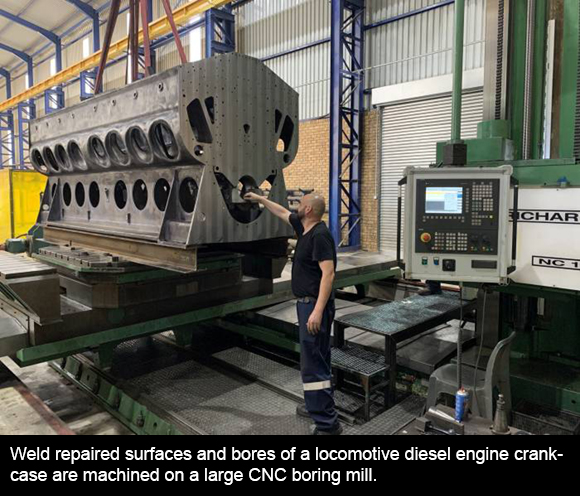In August this year a major locomotives operator awarded a contract to Metalplus to repair four 2250kW 16-cylinder diesel engine crankcases from its fleet of GE and GM locomotives dating from the 1970’s and 80’s.
It is the first contract for the repair of diesel engine crankcases Metalplus has won from the operator, which operates a fleet of over 300 of the aging locomotives.
The contract extends the scope of repair work Metalplus performs for the operator, for which it has regularly done repairs of the crankshafts of large diesel motors for many years.

“The upgrade we carried out at our repair facility, which also included substantial extension of our capabilities to enable us to perform new types of work for markets we haven’t previously served, contributed to our success in winning this contract,” said Roman Mornau, Metalplus’ General Manager.
Among the capability improvements Metalplus introduced at its repair facility was upgrading of its welding procedures to meet the operator’s prescribed ASME (American Society of Mechanical Engineers) welding standards for this specific application. “We also requalified our welders to meet the ASME requirements in preparation for the contract, which we bid for in June this year,” Roman stated.
The operator did an audit of Metalplus’ equipment and repair capabilities prior to awarding the contract.
“We added a line boring tail stock to our 20t line-boring mill to be able to line-bore the motors’ 4m long crank casings, which are longer than anything we have previously done in our machine shop. We also had to purchase specialised tooling, including serration cutting form tools and digital serration gauges, in order to perform the required repair work effectively,” Roman explained.
Preparations using new cleaning technologies for hardened oil residue and complex pressure testing of oil manifolds were performed successfully by Metalplus’ team.
“To accommodate a fast turnaround in cooperation with the operator we were tasked to install, leak test and remove cylinder liners. This work required in-house fabrication of tailormade tooling,” Roman remarked.
The contract was done on a fast turnaround basis to be completed in half the scheduled time. The only delays suffered were due to the industrial strike in October.

